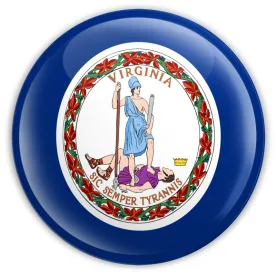In July 2020, the Safety and Health Codes Board of the Virginia Department of Labor and Industry approved an emergency temporary standard for COVID-19. In so doing, Virginia became the first state to issue such a temporary standard. On January 13, 2021, the Virginia Safety and Health Codes Board enacted a permanent standard for COVID-19. The “Final Permanent Standard for Infectious Disease Prevention of the SARS-CoV-2 Virus that Causes COVID-19” will be enforced by the Virginia Occupational Safety and Health program (VOSH) and is anticipated to take effect on January 27, 2021.
The permanent standard largely reiterates the provisions and requirements of the emergency temporary standard, and, for the most part, employers that are already in compliance with the emergency temporary standard will be able to comply with the permanent standard by maintaining existing policies and practices. However, there are several material modifications within the permanent standard, and employers will likely need to adjust their practices to reflect those changes. Notably, all required revisions to Infectious Disease Preparedness and Response Plans and training requirements are effective March 26, 2021.
Significantly, the permanent standard modifies and/or clarifies the emergency temporary standard in the following respects:
-
Employers that are unable, despite a good-faith effort, to obtain required personal protective equipment (PPE) due to commercial shortages, may be afforded leniency from enforcement of PPE requirements.
-
Several key definitions are revised as follows:
-
“Face covering” is more strictly defined to require “two or more layers of washable, breathable fabric that fits snugly against the sides of the face without any gaps, completely covering the nose and mouth and fitting securely under the chin,” and exhalation valves or vents are prohibited.
-
“Minimal occupational contact” is defined to refer to remote or solitary job assignments or where contact inside of six feet is brief and incidental (such as passing another person in a hallway).
-
“Severely immunocompromised” means “a seriously weakened immune system … from being on chemotherapy for cancer, being within one year out from receiving a hematopoietic stem cell or solid organ transplant, [having] untreated HIV infection with CD4 T lymphocyte count 20mg [per] day for more than 14 days. The degree of immunocompromise is determined by the treating provider.”
-
The threshold for positive case reporting to the Virginia Department of Health (VDH) is changed from any positive case to “two or more confirmed cases of COVID-19 [amongst the employer’s] own employees present at [a single] place of employment within a 14-day period.”
-
The symptom-based standard for return to work after a case of COVD-19 is updated as follows:
-
“Symptomatic employees known or suspected to be infected with the SARS-CoV-2 virus are excluded from returning to work until all three of the following have been met:
(i) The employee is fever-free (less than 100.0° F) for at least 24 hours, without the use of fever-reducing medications,
(ii) Respiratory symptoms, such as cough and shortness of breath have improved, and
(iii) At least 10 days have passed since symptoms first appeared.”
-
“Employees known to be infected with SARS-CoV-2 who never develop signs or symptoms are excluded from returning to work until 10 days after the date of their first positive RT-PCR test for SARS-CoV-2 RNA.”
(The permanent standard also recognizes that “a limited number of employees with severe illness may produce replication-competent virus beyond 10 days that may warrant extending duration of isolation for up to 20 days after symptom onset. Employees who are severely immunocompromised may require testing to determine when they can return to work.”)
-
Two or more employees traveling together in a single vehicle must wear employer-provided face coverings, until respiratory protection is readily available.
-
Face coverings are required where minimum occupational contact may occur (such as passing in the hallway).
-
Where “a face covering cannot be worn due to medical contraindications, employers shall provide and employees shall wear” face shields (in compliance with specific design and use criteria) and comply with physical distancing requirements.
-
Requirements for “medium,” “high,” and “very high” exposure risk hazards or job tasks are modified and/or clarified with respect to specific requirements for airflow, ventilation, and air filtration and compliance with the Virginia Uniform Statewide Building Code and the American Society of Heating, Refrigerating and Air-Conditioning Engineers (ASHRAE) Standards.
-
Biosafety requirements for “[d]iagnostic laboratories that conduct routine medical testing and environmental specimen testing for COVID-19” are relaxed;
-
The scope of analysis for an Infectious Disease Preparedness and Response Plan is expanded to require consideration of exposure risk for employees working in “higher risk activities involving potentially large numbers of people or enclosed work areas.”
-
Digital means (rather than physical or electronic signatures) are permitted for verification of employee training.
Key Takeaways
The revisions convey an overall intention by VOSH to provide clarification and make compliance a bit easier. For instance, providing a list of requirements for ventilation systems is easier to comply with than a reference to “follow all applicable ASHRAE standards.” Most employers have no idea what ASHRAE is, much less how to comply with its requirements. Additionally, the requirement to permit digital verification of training is a welcome one.
Some provisions still require further clarification. VOSH mandates “training requirements” to take effect on March 26, 2021, but the permanent standard does not add any new training requirements. Instead, it permits digital verification of training instead of physical or electronic signatures. Must employers now retrain all employees just to notify them of this one new detail?
Other regulations, such as the requirement to wear face coverings when in a vehicle with two or more employees, remain fuzzy. That standard only permits face coverings “[u]ntil adequate supplies of respiratory protection and/or personal protective equipment become readily available for non-medical and non-first responder employers and employees.” Reaching a point where N95 supply can meet or exceed the healthcare sector’s voracious demands seems unlikely to happen in the near future.
VOSH also provides a defense to a violation for failure to provide adequate PPE, “if (i) such PPE is not readily available on commercially reasonable terms and (ii) the employer or institution makes a good faith effort to acquire or provide such PPE as is readily available on commercially reasonable terms.” What does “readily available” mean? Are easier-to-obtain KN95s considered PPE by VOSH? There is also the issue with the term “commercially reasonable terms,” which traditionally means two very different things to employers and the agency. In many inspectors’ eyes, PPE is never unavailable because it is too expensive, arguing one cannot put a price on the cost of human health.
The permanent standard carries forward several challenges from the emergency temporary standard. First, it still continues to take a one-size-fits-all approach that does not account for significant differences in industries. Second, several of its provisions relating to return to work and close contact do not enable employers to benefit from continually evolving guidance from the U.S. Centers for Disease Control and Prevention (CDC). Third, it includes whistleblower protections for employees who report concerns to the news media or social media, which may invalidate some employers’ media policies. Third, the permanent standard lacks per se “safe harbor” protections for employers that protect employees by following CDC guidance. Finally, the permanent standard does not address COVID-19 vaccines or whether employers will be required to mandate their employees receive a COVID-19 vaccine.







 />i
/>i
